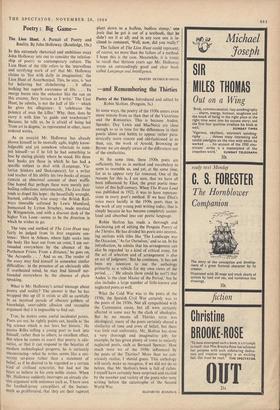—and Remembering the Thirties
Poetry of the Thirties. Introduced and edited by Robin Skelton. (Penguin, 5s.)
IN some ways, the poetry of the 1930s seems even more remote from us than that of the Victorians and the Romantics. This is because Auden, Spender, Day Lewis and MacNeice are close enough to us in time for the differences in their poetic idiom and habits to appear rather para- doxically, more remote and old-fashioned to us than, say, the work of Arnold, Browning or Byron; we are deeply aware of the differences not of the similarities.
At the same time, these 1930s poets are sufficiently like us in method and vocabulary to seem to resemble us, and yet, at the same time, for us to appear very far removed. One of the reasons for this is, I am sure, that we have all been influenced by Eliot, the great poetic inno- vator of this half-century. When The Waste Land was published in 1922, it was to have repercus- sions in every poet's method. If we hear Eliot's voice more lucidly in the 1930s poets than in the work of any young poet writing today, that is simply because he has become completely assimi- lated and absorbed into our poetic language.
Robin Skelton has made a thorough and fascinating job of editing the Penguin Poetry of the Thirties. He has divided his poets into interest- ing sections with titles like The Landscape was the Occasion,' As for Ourselves,' and so on. In his introduction, he admits that his arrangement can also be regarded 'as a kind of critical essay, for the act of selection and of arrangement is also an act of judgment.' But he continues, it has not been my intention to use the anthology primarily as a vehicle for my own views of the period. .. .' He admits (how could he not?) that Auden Is the clear Master of the Period,' but he also includes a large number of little-known and neglected poets as well.
What the Cold War was to the poets of the 1950s, the Spanish Civil War certainly was to the poets of the 1930s. Not all sympathised with the Communist cause, but all were certainly affected in some way by the clash of ideologies. But by no means all Thirties verse was ideological; many of the poets certainly shared a similarity of tone and even of belief, but there was little real uniformity. Mr. Skelton has done a very thorough and imaginative job; for example, he has given plenty of room to unjustly neglected poets, such as Bernard Spencer. How much were we of the 1950s influenced by the poets of the Thirties? More than we con- sciously realise, 1 should guess. This anthology will surely make us recognise, if we did not do so before, that Mr. Skelton's book is full of riches. I myself have certainly been surprised and excited by the number and variety of the poets who were writing before the catastrophe of the Second World War.
ELIZABETH JLNNINOS


































 Previous page
Previous page